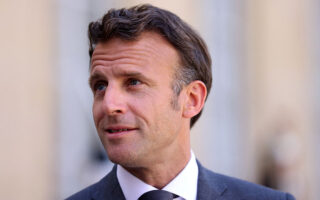France’s ‘democratic parties have to act like adults,’ says respected historian Patrick Weil

With the day after in France marked by uncertainty in party headquarters, Kathimerini contacted the distinguished French historian and visiting professor at Yale Law School, Patrick Weil. Weil, author of the 2023 book, “The Madman in the White House: Sigmund Freud, Ambassador Bullitt, and the Lost Psychobiography of Woodrow Wilson,” believes that French President Emanuel Macron did not achieve his goal following his surprise move to call a snap vote after the European Parliament elections, as the outcome opened up an “internal” front in his centrist party.
July 8 dawned with the New Popular Front and Jean-Luc Melenchon dominating the election. In your opinion, what led to the reversal of the results of the first round and the demise of the National Rally?
It is a fact that the left-wing coalition has gained the highest number of seats in the parliament, but it is an illusion to think that they have won the election because they cannot have a viable government without getting the support of MPs who are not part of the left-wing coalition. And there is a second illusion that the National Rally has lost. They did not win the absolute majority, but they gained a historical number of representatives in the French parliament. They are not going to be in the government, so they will be able to criticize whatever happens in the next month. And that result is the ideal situation for them to increase their votes and percentages, and perhaps elect the next president of the republic. So it is a very dangerous situation.
The last thing I want to say is that I do not think Jean-Luc Melenchon is dominating the left-wing alliance. His party has kept the same kind of number of MPs they had before the dissolution by President Macron. On the contrary, the Socialist group will more than double the number of MPs, while the Greens will increase their seats. All that makes the situation of Melenchon not as dominating as it used to be in the previous parliament, where his party was representing a majority of all the left-wing MPs.
As far as the National Rally is concerned, it is not a collapse as in the second round of the elections the left-wing coalition and Macron’s supporters created a “Republican Front” against the candidates of the National Rally, which thus did not get a majority. Then, on the last day of the campaign, local press, local radio and local TV interviewed the candidates of the National Rally and the French discovered that many of the National Rally’s candidates were absolutely unfit for being MPs.
Judging from the result, did Macron’s surprise move to call legislative elections have the intended result?
Macron lost a lot. First of all, when he dissolved the parliament, he thought he could win the majority because he did not expect the coalition of the left after a very divided campaign within the left for the European election. Secondly, he did not anticipate that in the second round of the election, the left coalition would arrive at number two or number one. Then what happened is that he infuriated his own prime minister, his whole government and his old supporters in the parliament for dissolving the parliament without any obvious reason and without discussing the issue with them. And so, he has no more friends in the parliament. It is interesting to note that when you read the program of the candidates from Macron’s party, his photo or his name did not appear in their program. So, he was probably considered by his own party as a burden, an obstacle to their campaign.
President Macron stated that he would not cooperate with the New Popular Front. Do you foresee a period of political instability?
On one side, Macron said that, but on the other side, the left-wing coalition said that they will choose the prime minister. Therefore, if they cannot bring to the president a proposal that guarantees a majority in the parliament, the president is not forced to nominate the prime minister they choose. Next Thursday, you will have the first meeting of the National Assembly, and they have to elect a president. Will the left-wing coalition cooperate to elect a left-wing president or cooperate in support of somebody who will be elected with their support? That would be the first test of the capacity of the different political forces in the parliament to organize a majority. But if the left-wing coalition reaches an agreement with other MPs and has the majority, Macron cannot refuse to nominate a prime minister who would have the support of the left. Otherwise, he will be himself risking impeachment. So, he has to cooperate.
Could Jean-Luc Melenchon be the next prime minister?
Surely not. And I think Jean-Luc Melenchon is perhaps more willing to run for the next presidential election than to become a Prime Minister.
Marine Le Pen’s party increased its seats from 89 to 142 and over 10 million people supported her agenda. Do you think that a situation of instability and governmental imbalance will favor her position in the 2027 presidential elections?
Yes, it will favor it. So, it is a very risky situation where all the democratic parties have to act like adults and create the conditions of a government that will respond to the message of the voters, including the voters who voted for the National Rally, who express anxiety and anger towards many issues. Otherwise, there is a big risk that Marine Le Pen could be the next president of France.






